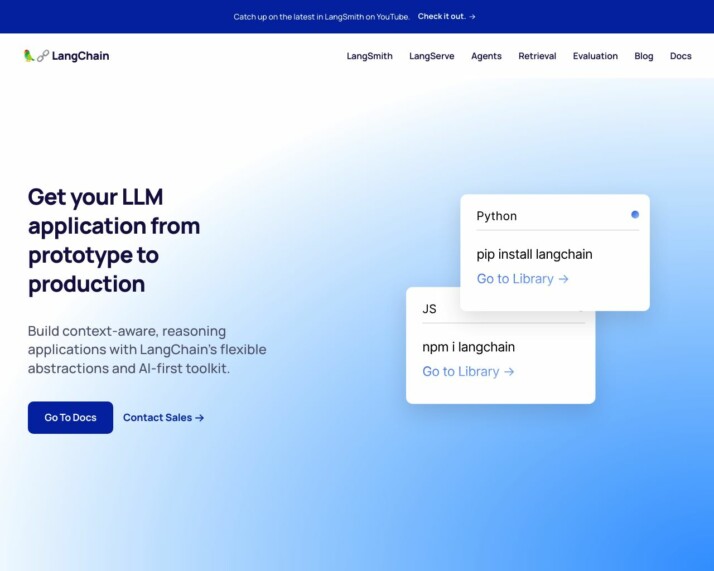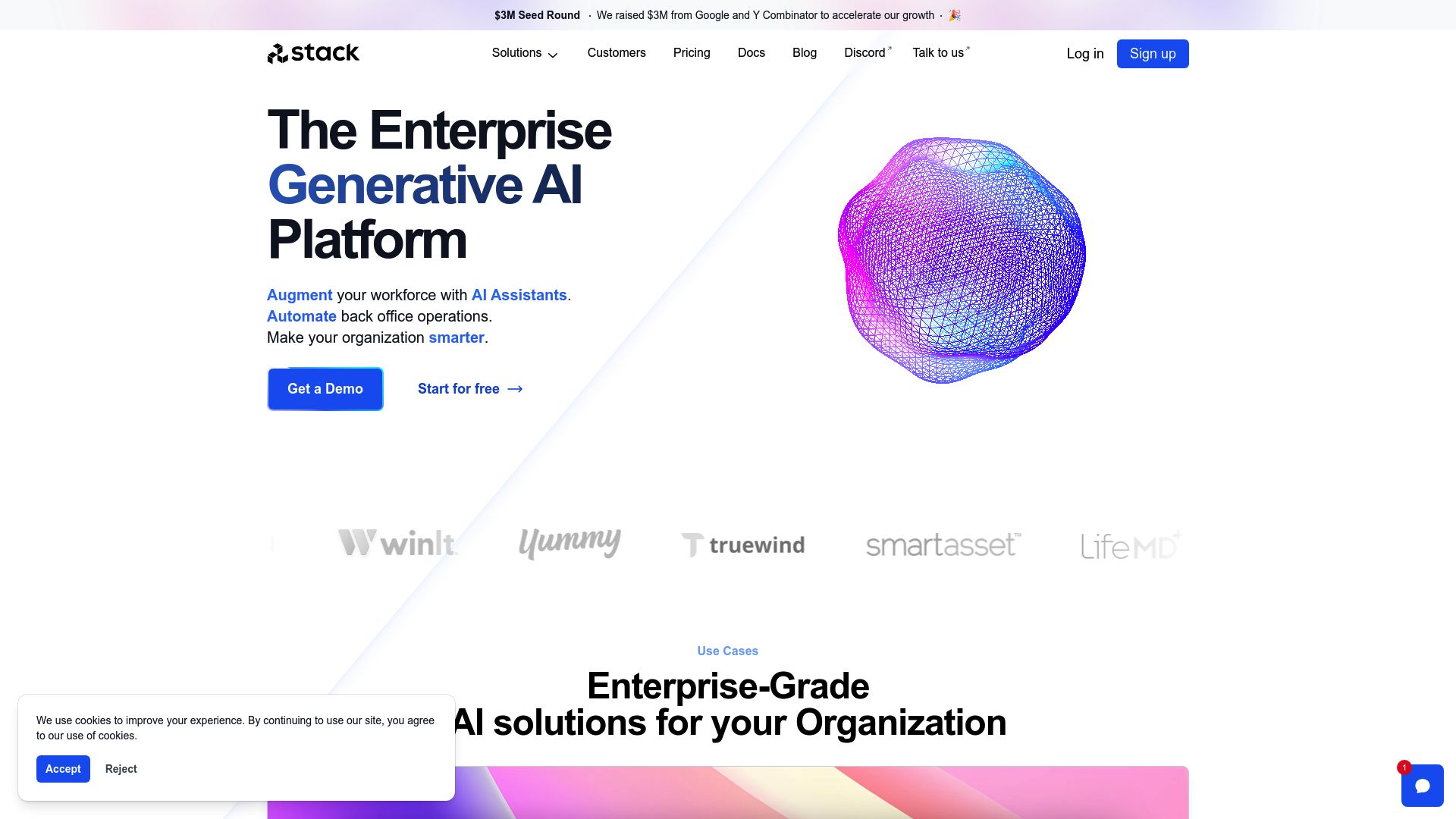LangChain vs. Stack AI: Comparing Developer and Low-Code AI Platforms
AI-powered applications are reshaping industries, but choosing the right development platform can be challenging. This comparison explores LangChain vs. Stack AI, and SmythOS, three distinct approaches to AI application creation. LangChain offers a comprehensive framework for developers seeking maximum flexibility. Stack AI provides a low-code solution, making AI accessible to non-technical users.
SmythOS emerges as a powerful alternative, combining advanced capabilities with user-friendly design. We’ll examine each platform’s strengths, limitations, and ideal use cases to help you determine the best fit for your AI development needs. Whether you’re a seasoned developer, a business leader, or an AI enthusiast, this analysis will guide you through the key features and trade-offs of these innovative tools.
LangChain Overview
LangChain empowers developers to build sophisticated applications powered by large language models (LLMs). This open-source framework simplifies the creation of AI-driven solutions by providing modular components and tools for every stage of the LLM application lifecycle.


LangChain’s core offering centers on its comprehensive suite of libraries and tools. These include LangGraph for building stateful multi-actor applications, LangSmith for debugging and monitoring, and LangServe for deploying chains as REST APIs. This ecosystem enables developers to rapidly prototype, test, and deploy LLM-powered applications with enhanced capabilities.
LangChain empowers developers to build sophisticated applications powered by large language models (LLMs). This open-source framework simplifies the creation of AI-driven solutions…
LangChain excels in its flexibility and integration capabilities. The platform supports a wide array of LLMs, including popular models from OpenAI and Anthropic, as well as open-source alternatives. Its modular design allows developers to mix and match components, creating custom solutions tailored to specific use cases. This adaptability makes LangChain particularly appealing for businesses seeking to leverage AI across various domains.
Key features of LangChain include:
– LangChain Expression Language (LCEL) for declarative component chaining- First-class streaming support for improved latency- Advanced retrieval techniques, including retrieval-augmented generation (RAG)- Tools for ensuring structured output from LLMs- Extensive documentation and a growing community of developers
LangChain excels in its flexibility and integration capabilities. The platform supports a wide array of LLMs… Its modular design allows developers to mix and match components…
While LangChain offers powerful capabilities, it primarily caters to developers with programming experience. The platform lacks a visual builder or no-code editor, which may limit accessibility for non-technical users. Additionally, as an open-source project, enterprise-grade support and certain advanced features may require additional configuration or third-party solutions.
LangChain’s position in the competitive landscape stems from its open-source nature and comprehensive toolkit. It appeals to developers and organizations seeking maximum flexibility and customization in their LLM applications. However, users requiring out-of-the-box solutions or extensive visual programming interfaces may find other platforms more suitable for their needs.
Stack AI Overview
Stack AI empowers users to create and deploy AI-powered workflows and custom assistants without extensive coding expertise. The platform’s low-code approach democratizes access to advanced AI capabilities, enabling businesses of all sizes to leverage generative AI for process automation and enhanced decision-making.


Stack AI’s user-friendly drag-and-drop interface simplifies AI application development, making it accessible to non-programmers. The platform offers enterprise-grade security, complying with SOC 2, HIPAA, and GDPR standards to ensure data protection and privacy. Users can deploy applications through customizable interfaces or API endpoints, catering to diverse implementation needs.
Stack AI’s user-friendly drag-and-drop interface simplifies AI application development, making it accessible to non-programmers.
Extensive integrations with popular services like Google Drive, Salesforce, and Slack enhance Stack AI’s versatility. The platform includes a library of pre-built templates for common use cases, accelerating development for specific needs. However, Stack AI lacks some advanced features like a dedicated agent work scheduler or hosted vector database, which may limit its applicability for certain complex AI projects.
Stack AI provides high-touch customer support from experienced AI professionals, ensuring smooth implementation and operation of AI projects. This level of support, combined with the platform’s focus on accessibility, positions Stack AI as a strong choice for businesses looking to adopt AI solutions without significant technical overhead. While it may not offer the full range of advanced features found in some competitors, Stack AI’s emphasis on usability and rapid deployment makes it a compelling option for organizations seeking to quickly implement AI-driven processes and assistants.
Feature Comparison
LangChain and Stack AI offer different approaches to building AI-powered applications. LangChain provides a comprehensive framework for developers to create sophisticated LLM-based solutions, while Stack AI focuses on low-code AI development accessible to non-technical users.
LangChain excels in flexibility and customization, offering tools like LangGraph for building complex, stateful AI applications. It supports a wide range of LLMs and integrations, allowing developers to craft tailored solutions. However, LangChain lacks a visual builder or no-code editor, limiting accessibility for non-technical users.
In contrast, Stack AI emphasizes ease of use with its drag-and-drop interface and pre-built templates, making AI development more accessible to business users without coding expertise. Stack AI provides enterprise-grade security features and high-touch customer support, but may not offer the same level of advanced customization as LangChain for complex AI projects.
LangChain’s developer-centric approach offers powerful tools for building and deploying AI agents, including LangSmith for debugging and monitoring. Stack AI, while more user-friendly, may have limitations in advanced features like dedicated agent work scheduling or hosted vector databases, potentially constraining its use in highly specialized AI applications.
Feature Comparison Table
| LangChain | Stack AI | SmythOS | |
|---|---|---|---|
| CORE FEATURES | |||
| Visual Builder | ❌ | ✅ | ✅ |
| No-Code Options | ❌ | ✅ | ✅ |
| Agent Work Scheduler | ❌ | ✅ | ✅ |
| SECURITY | |||
| Constrained Alignment | ❌ | ❌ | ✅ |
| IP Control | ❌ | ❌ | ✅ |
| COMPONENTS | |||
| Huggingface AIs | ✅ | ❌ | ✅ |
| Zapier APIs | ❌ | ✅ | ✅ |
| Data Lakes | ❌ | ✅ | ✅ |
| DEPLOYMENT OPTIONS (EMBODIMENTS) | |||
| Deploy as Webhook | ❌ | ✅ | ✅ |
| Staging Domains | ❌ | ✅ | ✅ |
| Production Domains | ❌ | ✅ | ✅ |
| Deploy as Scheduled Agent | ❌ | ❌ | ✅ |
| DATA LAKE SUPPORT | |||
| Hosted Vector Database | ❌ | ✅ | ✅ |
| Sitemap Crawler | ❌ | ❌ | ✅ |
| YouTube Transcript Crawler | ❌ | ❌ | ✅ |
| URL Crawler | ❌ | ✅ | ✅ |
| Word File Support | ❌ | ✅ | ✅ |
Best Alternative to LangChain and Stack AI
SmythOS stands out as a superior alternative to LangChain and Stack AI, offering a comprehensive solution for AI agent development and deployment. We excel in combining ease of use with powerful features, making advanced AI capabilities accessible to users of all skill levels.
Our platform’s intuitive drag-and-drop interface simplifies the process of creating complex AI workflows, eliminating the need for extensive coding knowledge. This visual approach sets us apart from LangChain’s developer-centric framework, allowing a broader range of users to harness the power of AI.
SmythOS stands out as a superior alternative to LangChain and Stack AI, offering a comprehensive solution for AI agent development and deployment. We excel in combining ease of use with powerful features…
Unlike Stack AI’s limited customization options, SmythOS provides unparalleled flexibility. We support integration with a wide array of AI models, including those from OpenAI, Anthropic, and Hugging Face, giving users the freedom to choose the best tools for their specific needs. Our extensive API integrations and support for various data sources further enhance this versatility, enabling seamless connection with existing systems and workflows.
SmythOS truly shines in its deployment capabilities. We offer multiple options for bringing AI agents to life, including API endpoints, webhooks, scheduled tasks, and even deployment as ChatGPT plugins or Alexa skills. This flexibility surpasses both LangChain and Stack AI, allowing users to integrate AI seamlessly into their existing ecosystems. Additionally, our platform includes advanced features like constrained alignment and IP control, ensuring security and ethical AI use—areas where our competitors fall short.
By choosing SmythOS, users gain access to a comprehensive AI development environment that combines ease of use with enterprise-grade capabilities. Our platform empowers organizations to create, deploy, and manage AI agents efficiently, driving innovation and productivity across various industries.
Conclusion
LangChain and Stack AI offer distinct approaches to AI development, each with its own strengths. LangChain provides a comprehensive framework for developers seeking maximum flexibility in building sophisticated LLM applications. Stack AI, with its low-code platform, makes AI development more accessible to non-technical users.
However, SmythOS emerges as the superior choice, combining the best of both worlds. Our platform offers unparalleled versatility with its drag-and-drop interface, extensive integrations, and support for various AI models. SmythOS empowers users to create and deploy AI agents across multiple platforms effortlessly, making advanced AI capabilities accessible to both developers and business users.
Unlike LangChain, which requires coding expertise, or Stack AI, which may lack some advanced features, SmythOS provides a comprehensive solution for AI development and deployment. Our platform supports multimodal interactions, problem-solving capabilities, and scalable embodiments such as APIs, chatbots, and scheduled agents. This versatility, combined with enterprise-grade security and a user-friendly interface, positions SmythOS as the ideal choice for organizations looking to harness the full potential of AI.
To experience the power of SmythOS firsthand, create a free account today. Discover how our platform can revolutionize your AI development process, streamline your workflows, and drive innovation across your organization. With SmythOS, you’ll be at the forefront of the AI revolution, creating intelligent agents that can transform your business operations and unlock new possibilities.
Last updated:
Disclaimer: The information presented in this article is for general informational purposes only and is provided as is. While we strive to keep the content up-to-date and accurate, we make no representations or warranties of any kind, express or implied, about the completeness, accuracy, reliability, suitability, or availability of the information contained in this article.
Any reliance you place on such information is strictly at your own risk. We reserve the right to make additions, deletions, or modifications to the contents of this article at any time without prior notice.
In no event will we be liable for any loss or damage including without limitation, indirect or consequential loss or damage, or any loss or damage whatsoever arising from loss of data, profits, or any other loss not specified herein arising out of, or in connection with, the use of this article.
Despite our best efforts, this article may contain oversights, errors, or omissions. If you notice any inaccuracies or have concerns about the content, please report them through our content feedback form. Your input helps us maintain the quality and reliability of our information.
